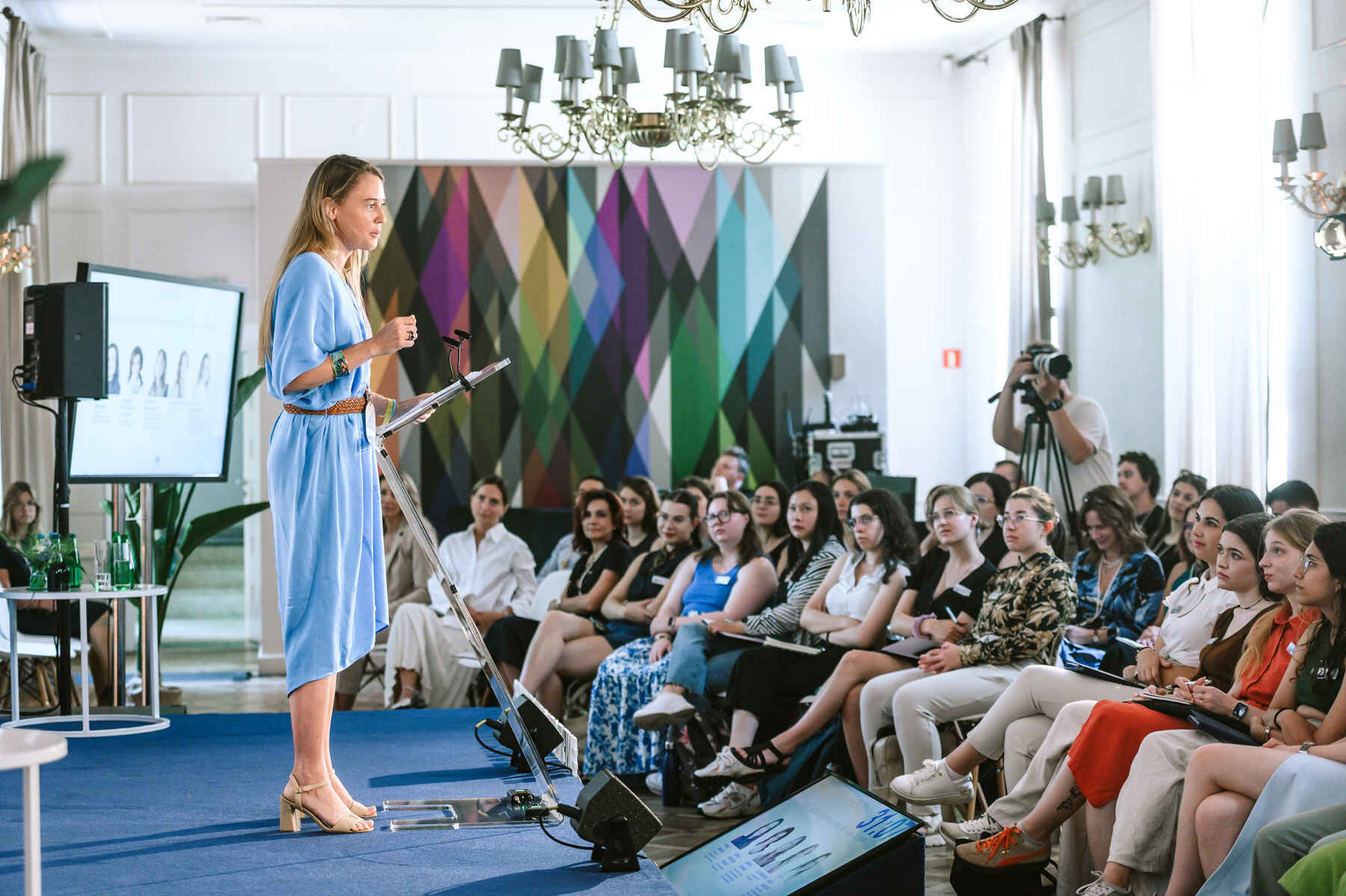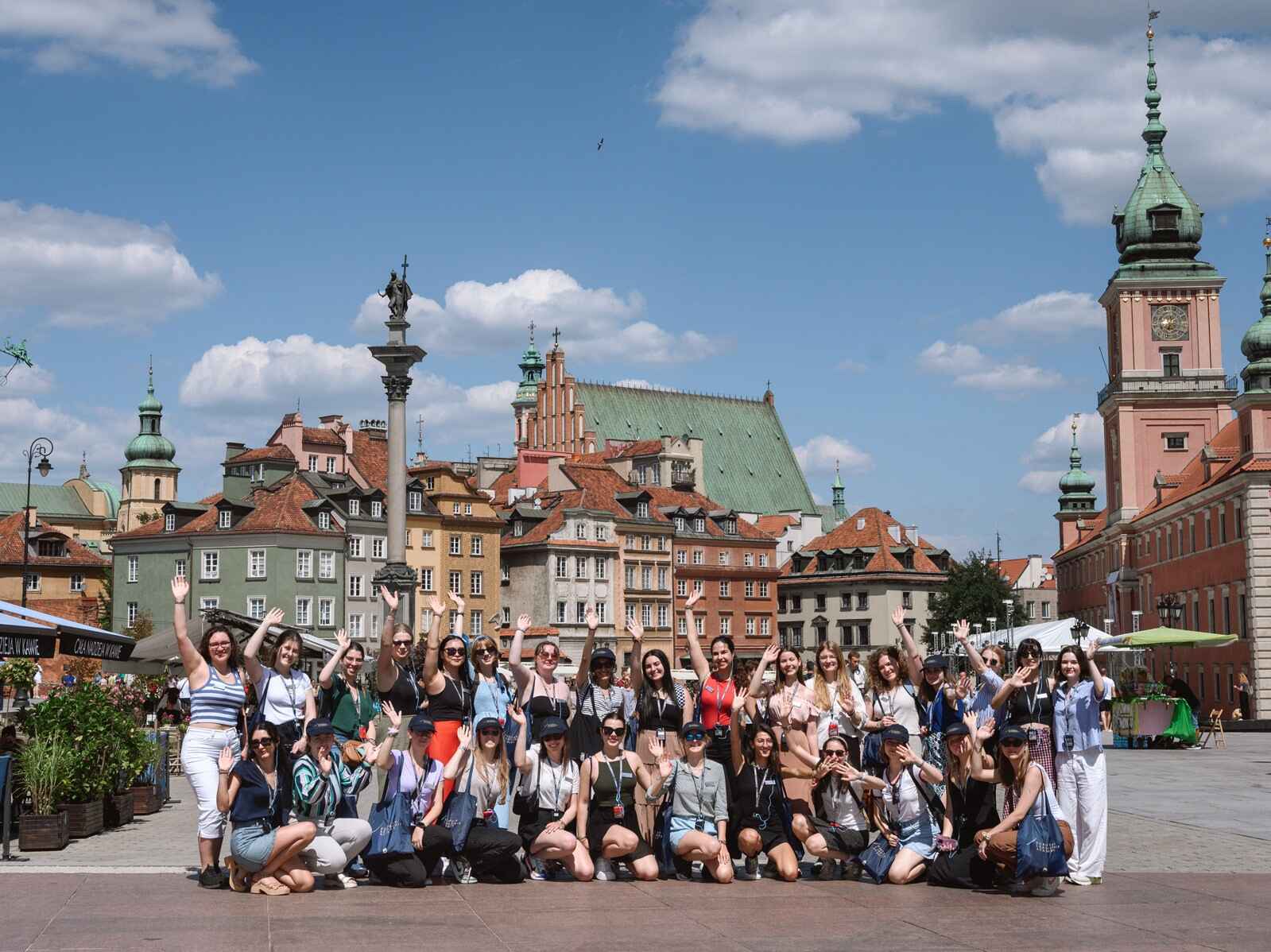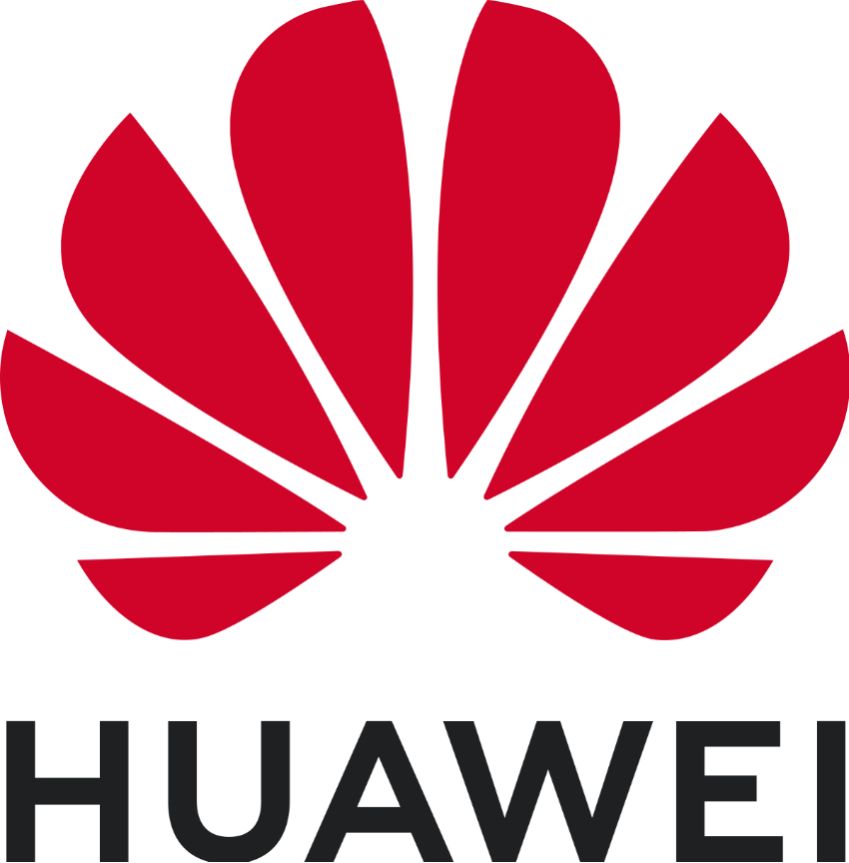"In a world where you can be anything, be the person who builds bridges.” That's the philosophy behind the European Leadership Academy, a programme that aims to support, inspire and empower female leadership in the digital age.
Since it was launched in 2021, the programme has trained more than 100 young women from across Europe at its summer and winter academies. This year, 29 students, from EU member states, plus Ukraine and the Western Balkans, descended on Warsaw in Poland to follow an intensive programme of workshops, masterclasses, discussion panels, and teambuilding activities. For this edition, the ELA was also nominated as a finalist for the European Digital Skills Awards 2024 by the European Commission. Since its inaugural edition in 2021, over 12,000 applications have been submitted to the Academy and over 100 students have participated in the prestigious programme.
The Opening Ceremony took place on Sunday, 21 July, where the students had the opportunity to take in the inspirational words of a series of distinguished female leaders. Berta Herrero, Founder and Director of the European Leadership Academy and Head of Diversity, Equity, and Inclusion at Huawei Europe, welcomed the students and encouraged them to “be the architects of a future where technology serves humanity”. She added that “leadership is not about exercising power over others – it’s about inspiring”, reminding the students that “in a world where you can be anything, be the person who builds bridges.” Dr. hc. Violeta Bulc, Curator and Founder of the Ecocivilisation Movement and former EU Commissioner for Transport from Slovenia, took the opportunity to share her views on the integrated world and AI: “technology is beautiful. As a computer engineer, I love technology. But technology is a tool, not just a goal; it has to be used correctly. It's our perception of the capacity that technology has to improve humanity that can help make our lives better.”
"Leadership is not about exercising power over others – it’s about inspiring"
- Berta Herrero, Founder and Director of the European Leadership Academy and Head of Diversity, Equity, and Inclusion at Huawei Europe.
The Parliament followed the final three days of the Academy and heard from a range of distinguished speakers and bright minded students. During the training week hosted at Klub Bankowca, a historic 19th-century building listed in the Polish Historic Buildings register, the students followed an intensive programme of workshops, masterclasses, discussion panels, and teambuilding activities, all organised through a selection of daily themes. Monday was Inspiration Day, Tuesday was Tech and Ethics Day, Wednesday was Sustainability Day, culminating in a final day where the students presented their projects to their mentors, media, and speakers. These projects included apps like NutriFridge, which utilises machine learning to create personalised diets for women by tracking the quality and quantity of food in their fridge in real-time. The app also aims to reduce food waste and, by accessing personal health records, ensures that women receive the right nutrients based on their health conditions. Another project, GuardHer, focused on improving women’s safety. For this project, the students created an app that used AI to help, predict and analyse data to provide the users personalised functionalities, like real time safety alerts and a map feature that shows you where you are and which streets not to take. Red zones on the map show that a lot of incidents have been reported in that area, while Ana, the chat bot, can guide and support you 24/7 in any situation.

In an interview with The Parliament, ELA students, Cassandra Sowa Candela, a programming student at UNED with a background in Big Data and Artificial Intelligence, and Tesla Visser, a civil engineering student at Delft University of Technology with various academic experiences including consulting, tutoring, and PR, revealed how the quality and level of instruction at the Academy impressed and surprised them. During the interview, they shared insights on the process behind the ideation of Energize, an app that uses AI to predict women’s energy levels, and assist them during different phases of their cycle because “women operate on a 28-day cycle in a world that revolves on a 24-hour cycle”. They explained that “after the initial team approach to our idea, we became more open with each other and developed our own system to properly and efficiently use our time”. The idea behind the project was based on the Spoon Theory, taken from a 2003 essay by American writer Christine Miserandino. The Spoon Theory is illustrates how people with chronic illnesses, disabilities, and mental health issues manage their limited daily energy. Each "spoon" represents a unit of energy needed for activities. Once they run out of spoons, they must rest to recharge, requiring careful planning and rationing of their energy throughout the day. In the app, spoons are substituted by lighting bulbs.
When asked for their number one piece of advice for future ELA students, Cassandra and Tesla suggested that the next generation of female leaders must “trust the process” and that most importantly, “the academy will always be a safe place, and all the people behind it will encourage you from the beginning, supporting you throughout your stay but also your future career”. The duo concluded by adding that “it’s an intense and sometimes challenging programme, but try to always be kind to yourselves and keep a positive mindset”.
Around 24% of the gender pay gap is related to the overrepresentation of women in relatively low-paying sectors, such as care, health and education
Over the last two days of the Academy, the students had the opportunity to follow insightful masterclasses and workshops, including a deep dive on Entrepreneurship and one on Gender Equality. During the Entrepreneur’s mindset: persistence, resilience and success workshop, the students benefitted from the experience of distinguished business leaders who shared their journeys. When asked what it truly means to be an entrepreneur, Ozioma Egwuonwu, Chief Strategic Transform Officer at BurnBright International said: “I believe that one of the fundamental aspects of being an entrepreneur is your relationship with opportunity. An entrepreneur sees an opportunity everywhere”. Moderator Angela Stathi MBA, a distinguished expert in finance, technology, and sustainability, added that “human beings are born to be investigating and learning things. Entrepreneurship is an alchemist of the power of ambition”.
During the Shattering Glass Ceilings: Towards Real Equality discussion, moderated by ELA alumna Georgina Toronyi, various situations of gender disparity experienced by the speakers throughout their careers were described and addressed. They shared valuable advice on how to combat the widespread societal misconception that 'the place for women is not in the public sphere.' Topics covered in the discussion created an interactive atmosphere, with many questions and comments offered by the students. According to the Gender Pay Gap in the EU, women earn on average 13% less per hour than men, and this gap has shrunk minimally over the last decade. Around 24% of the gender pay gap is related to the overrepresentation of women in relatively low-paying sectors, such as care, health and education. In relation to this, the Gender Equality Index shows that the European Union, with a score of 70.2 points out of 100, still has a significant amount of work to do to reach gender equality. This is particularly in the domain of knowledge, representing the inequalities in educational attainment, participation in education and training, and power. Imbalance in gender equality therefore remains in decision-making positions across the political, economic and social spheres.

Whilst addressing the situation of women in the labour market, particularly in relation to the gender pay gap, Sara Baiocco, Policy Officer at DG EMPL, European Commission, reminded the students that 'many inequalities in our society are not easily measurable—consider the pervasive stereotypes, the undervaluing of highly feminised jobs, and the phenomenon of gender washing. These issues illustrate how economic and financial harm related to gender inequality is deeply interwoven with the broader damage to our society.' Mann Nguyen, Digital Policy Manager at TIC Council and Member of the EU Stakeholder Cybersecurity Certification Group, reminded the audience that 'education and communication are key. Education at a young age, education for men and women together, because you don't change society by educating only half of it.'
To round off the students' journey, a selection of guests, judges, speakers and media representatives were invited to the 2024 Summer School Gala. At the gala, a selection of students were presented with awards, such as the 2024 Future Leader Award, Critical Thinker Award, Best Communicator Award, Equality Champion Award, and more. A series of emotional speeches added to the overall tone of the evening. Among them was a speech by ELA Founder Berta Herrero, who reminded the students that 'the most powerful tool you have is each other'. A further inspiring speech from Former Deputy Prime Minister of Ireland, Mary Coughlan, concluded that 'It is my view that women like yourselves will make a huge difference to your community, to your country, and to your professions, and I can’t wait to see you here again some years from now,' and that 'in a world of chaos, conflict, and inequality, women are very much part of creating the solutions”.
In partnership with

This article was produced in partnership with Huawei.
Sign up to The Parliament's weekly newsletter
Every Friday our editorial team goes behind the headlines to offer insight and analysis on the key stories driving the EU agenda. Subscribe for free here.